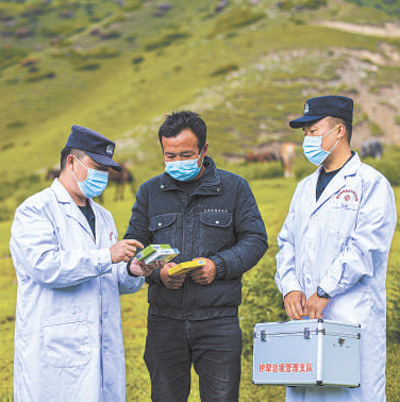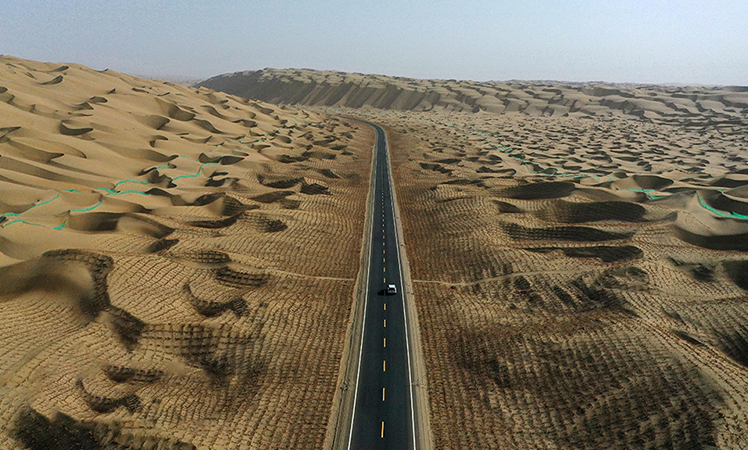Xinjiang vigorously develops specialty industries while promoting ethnic unity, protecting ecological environment

Photo shows a staff member working in a farm of the sixth division of the Xinjiang Production and Construction Corps in northwest China’s Xinjiang Uygur Autonomous Region. (Photo/Wang Zhiqing)
Xinjiang, a place where specialty industries thrive, ethnic groups stay closely united, and the ecological environment keeps improving, has become a prosperous and harmonious place where the local residents live in happiness and contentment.
Driving development of specialty industries
Wanfang village in Hotan prefecture, situated at the southern edge of the Taklimakan Desert, China’s largest desert, used to have a weak economic foundation.
“There is a long tradition of planting roses in our village, but the scale of rose cultivation and the output value of rose planting are less satisfactory,” said Metturdi MetSidiq, secretary of the Party committee in Wanfang village.
In 2017, Xinjiang Chemical Engineering Co., Ltd. under the China Energy Investment Corporation built a rose planting demonstration park in Wanfang village, and started to lead efforts to improve the quality and efficiency of rose planting in the locality. In 2021, a cooperative was established in Wanfang village and roses were planted on 500 mu (33.33 hectares) of contiguous farmland.
Nowadays, the quality of the development of various specialty industries across Xinjiang has continued increasing, which has laid a solid foundation for local rural rejuvenation.

Border police deliver medicine to a herder and tell him how to apply the medicine to his livestock, in the Kazak Autonomous Prefecture of Ili, northwest China’s Xinjiang Uygur Autonomous Region. (Photo/Wang Shuai)
To solve the difficulties local farmers have encountered in selling their specialty products, Xinjiang has built a fruit collector network that covers all fruit-producing areas in the autonomous region. The capacity of the warehouses to process, sell and distribute fruits in these places has reached 5 million tonnes, and a total of 5,370 sales outlets have been built outside Xinjiang.
In addition, under the framework of the pairing assistance program, regions in Xinjiang have received capital, technical, and talent support from their inland counterparts to better develop their specialty industries.
The government work report of the Xinjiang Uygur Autonomous Region 2022 pointed out that Xinjiang will cultivate advantageous industries and step up the construction of a modern industrial system which has Xinjiang’s characteristics, and can benefit people of various ethnic groups in the autonomous region and support high-quality development.
Xinjiang will actively promote the development of the grape wine, dairy, and ethnic medicine industries, among other industries, to help increase the income of people of various ethnic groups in the autonomous region and further enhance their sense of benefit, according to the government work report.
Further strengthening ethnic unity
On every Monday or during important festivals, Salihjan Imin, an older Uygur man living in Tacheng city, would raise the Chinese national flag in his small courtyard. His neighbors from various ethnic groups would also gather there to participate in the ceremonies.
In the summer of 2009, Salihjan Imin told his family members that he would raise the Chinese national flag in his courtyard to safeguard national unity and promote patriotism.
“Our neighbors of different ethnic groups would gather here to participate in singing and dancing activities. We felt that our relationship had become closer after every gathering,” said Chen Xihong, a neighbor of Salihjan Imin.

Photo shows the scenery of Hemu village, Burqin county, northwest China’s Xinjiang Uygur Autonomous Region. (Photo/Xu Guangjian)
In October 2016, Xinjiang kicked off a campaign to promote ethnic unity. In 2021, more than 1.2 million officials and workers paired up with 1.6 million households of different ethnic groups as “relatives”.
Ramping up efforts to protect the local ecological environment
In recent years, Xinjiang has taken intensified efforts to rescue and protect rare, endangered and endemic wild animals. As a result, the habitats of wild animals in Xinjiang have continuously been restored and the populations of wildlife have kept expanding.
The number of wild horses released into the wild in Mount Kalamaili Ungulate Nature Reserve in Xinjiang has reached 328, which is nearly 10 times the number of wild horses released into the wild in the reserve for the first time in 2001.
Qiemo county, located near the desert, has a very fragile ecological environment.
During a tree planting activity held in April 2022, officials and residents in Qiemo county planted 300,000 saxaul trees (haloxylon ammodendron) and 20,000 populus diversifolia trees in the hinterland of the Taklimakan Desert. The activity has been held for the 24th consecutive year in the locality.
In recent years, a protective green ecological barrier consisting of saxaul trees and weeds has been built in the desert area near Qiemo county to protect the local ecological environment. Thanks to these efforts, the local people’s living environment has been continuously improved.
Qiemo is just one of the many places in Xinjiang that have taken concrete measures to control desertification. In 2021, Xinjiang restored 2.27 million mu (1 mu is 667 square meters) of rivers, lakes and wetlands, planted 2.65 million mu of trees, restored 6.34 million mu of grasslands, turned 570,000 mu of farmland back into forest, and tamed 6.6 million mu of land experiencing desertification.
Photos
Related Stories
- Zimbabwean student savors freedom, diversity in Xinjiang
- Western media will fail in propaganda against China
- U.S. smear campaign against Xinjiang reveals true face of hegemony
- Archaeologists unearth 5,000-yr-old bronze ware in Xinjiang
- All prefectures in Xinjiang covered with 750-kV power network
- China's Xinjiang sees surging cross-border e-commerce trade
- Xinjiang provides virus-hit businesses with financial support
- China's Xinjiang offers subsidies on home appliances to boost consumption
- New blueprint paves way for stability, development in China's Xinjiang
- Online fair assists poverty alleviation in NW China's Xinjiang
Copyright © 2022 People's Daily Online. All Rights Reserved.









